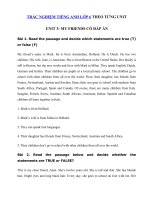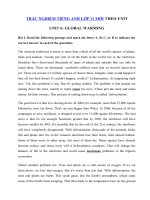Trắc nghiệm reading tiếng anh lớp 11 unit 3 becoming independent vndoc com
Bạn đang xem bản rút gọn của tài liệu. Xem và tải ngay bản đầy đủ của tài liệu tại đây (129.32 KB, 7 trang )
VnDoc - Tải tài liệu, văn bản pháp luật, biểu mẫu miễn phí
TRẮC NGHIỆM TIẾNG ANH LỚP 11 MỚI THEO UNIT
UNIT 3: BECOMING INDEPENDENT
Bài 1. Read the following passage and mark the letter A, B, C, or D to indicate the
correct answer to each of the questions.
ARE TRADITIONAL WAYS OF LEARNING THE BEST?
Read about some alternative schools of thought…
One school in Hampshire, UK, offers 24-hour teaching. The children can decide when or
if they come to school. The school is open from 7 a.m. to 10 p.m., for 364 days a year
and provides online teaching throughout the night. The idea is that pupils don't have to
come to school and they can decide when they want to study. Cheryl Heron, the head
teacher, said “Some students learn better at night. Some students learn better in the
morning.” Cheryl believes that if children are bored, they will not come to school. “Why
must teaching only be conducted in a classroom? You can teach a child without him ever
coming to school.”
Steiner schools encourage creativity and free thinking so children can study art, music
and gardening as well as science and history. They don’t have to learn to read and write
at an early age. At some Steiner schools the teachers can’t use textbooks. They talk to
the children, who learn by listening. Every morning the children have to go to special
music and movement classes called “eurhythmy”, which help them learn to concentrate.
Very young children learn foreign languages through music and song. Another
difference from traditional schools is that at Steiner schools you don't have to do any
tests or exams.
A child learning music with the Suzuki method has to start as young as possible. Even
two-year-old children can learn to play difficult pieces of classical music, often on the
violin. They do this by watching and listening. They learn by copying, just like they
learn their mother tongue. The child has to join in, but doesn't have to get it right. “They
VnDoc - Tải tài liệu, văn bản pháp luật, biểu mẫu miễn phí
soon learn that they mustn't stop every time they make a mistake. They just carry on,”
said one Suzuki trainer. The children have to practise for hours every day and they give
performances once a week, so they learn quickly. “The parents must be involved too,”
said the trainer, “or it just doesn't work.”
Question 1: Which of the following is NOT true about 24-hour teaching?
A. Students can come to school from 7 a.m. to 10 p.m.
B. Students can study online at night.
C. Students can choose the time to study.
D. Some students need to study in the morning and some need to study at night.
Question 2: According to Cheryl Heron, teaching ____.
A. should happen throughout the night
B. is not necessarily carried out in class
C. is for children who will not come to school
D. must be around the year
Question 3: Steiner schools don't ____.
A. encourage children's creativity and free thinking
B. allow teachers to teach things out of textbooks
C. teach reading and writing to young children
D. teach music to children
Question 4: Which of the following is TRUE about Steiner schools?
VnDoc - Tải tài liệu, văn bản pháp luật, biểu mẫu miễn phí
A. They are different from traditional schools.
B. Young children are not taught foreign languages.
C. Students must concentrate on music.
D. Students have to do exams and tests
Question 5: Which of the following is the most suitable title for the third paragraph?
A. Traditional ways of teaching
B. 24-hour teaching
C. Learn by listening
D. Starting young
Question 6: Students learning music with Suzuki method ____.
A. must learn difficult music .
B. like to learn their mother tongue
C. stop when they make mistakes
D. start at an early age
Question 7: The word “this” in paragraph 3 refers to ____.
A. starting as young as possible
B. the violin
C. playing difficult pieces of music
D. learning their mother tongue
VnDoc - Tải tài liệu, văn bản pháp luật, biểu mẫu miễn phí
Question 8: The word “involved” in paragraph 3 is closest in meaning to ____.
A. engaged
B. encouraging
C. accepting
D. rejecting
Bài 2. Read the following passage and mark the letter A, B, C, or D on your answer
sheet to indicate the correct answer to each of the questions.
William Sydney Porter (1862-1910), who wrote under the pseudonym of O. Henry, was
born in North Carolina. His only formal education was to attend his Aunt Lina’s school
until the age of fifteen, where he developed his lifelong love of books. By 1881 he was a
licensed pharmacist. However, within a year, on the recommendation of a medical
colleague of his Father’s, Porter moved to La Salle County in Texas for two years
herding sheep. During this time, Webster’s Unabridged Dictionary was his constant
companion, and Porter gained a knowledge of ranch life that he later incorporated into
many of his short stories. He then moved to Austin for three years, and during this time
the first recorded use of his pseudonym appeared, allegedly derived from his habit of
calling “Oh, Henry” to a family cat. In 1887, Porter married Athol Estes. He worked as a
draftsman, then as a bank teller for the First National Bank.
In 1894 Porter founded his own humor weekly, the “Rolling Stone”, a venture that failed
within a year, and later wrote a column for the Houston Daily Post. In the meantime, the
First National Bank was examined, and the subsequent indictment of 1886 stated that
Porter had embezzled funds. Porter then fled to New Orleans, and later to Honduras,
leaving his wife and child in Austin. He returned in 1897 because of his wife’s continued
ill-health, however she died six months later. Then, in 1898 Porter was found guilty and
sentenced to five years imprisonment in Ohio. At the age of thirty five, he entered prison
as a defeated man; he had lost his job, his home, his wife, and finally his freedom. He
emerged from prison three years later, reborn as O. Henry, the pseudonym he now used
VnDoc - Tải tài liệu, văn bản pháp luật, biểu mẫu miễn phí
to hide his true identity. He wrote at least twelve stories in jail, and after re-gaining his
freedom, went to New York City, where he published more than 300 stories and gained
fame as America’s favorite short Story writer. Porter married again in 1907, but after
months of poor health, he died in New York City at the age of forty-eight in 1910. O.
Henry’s stories have been translated all over the world.
Question 9: According to the passage, Porter’s Father was ______.
A. the person who gave him a life-long love of books
B. a medical doctor
C. a licensed pharmacist
D. responsible for his move to La Salle County in Texas
Question 10: Why did the author write the passage?
A. to outline the career of a famous American
B. because of his fame as America’s favorite short story writer
C. because it is a tragic story of a gifted writer
D. to outline the influences on O. Henry’s writing
Question 11: The word “imprisonment” in paragraph 2 is closet in meaning to _______.
A. captivity
B. escape
C. insult
D. punishment
Question 12: What is the passage primarily about?
VnDoc - Tải tài liệu, văn bản pháp luật, biểu mẫu miễn phí
A. The life and career of William Sydney Porter.
B. The way to adopt a nickname.
C. O.Henry’s influence on American literature.
D. The adventures of O.Henry.
Question 13: The author implies which of the following is true?
A. Porter’s wife might have lived longer if he had not left her in Austin when he fled.
B. Porter was in poor health throughout his life.
C. O. Henry is as popular in many other countries as he is in America.
D. Porter would probably have written less stories if he had not been in prison for three
years.
Question 14: Which of the following is true, according to the passage?
A. Porter left school at 15 to become a pharmacist
B. Porter wrote a column for the Houston Daily Post called “Rolling Stone”
C. The first recorded use of his pseudonym was in Austin
D. Both of Porter’s wives died before he died
Question 15: The word “pseudonym” in the passage refers to ___________.
A. William Sydney Porter
B. O. Henry
C. Athol Estes
D. the Aunt Lina
VnDoc - Tải tài liệu, văn bản pháp luật, biểu mẫu miễn phí
Đáp án
1. D
2. B
3. C
4. A
5. D
6. D
7. C
9. B
10. A
11. A
12. A
13. C
14. C
15. B
8. A
Mời bạn đọc tham khảo thêm tài liệu Tiếng Anh lớp 11 tại đây:
Bài tập Tiếng Anh lớp 11 theo từng Unit: />Bài tập Tiếng Anh lớp 11 nâng cao: />Bài tập trắc nghiệm trực tuyến Tiếng Anh lớp 11: />









